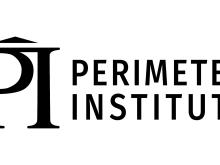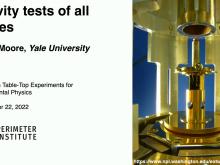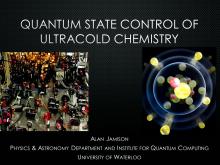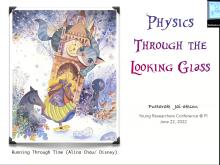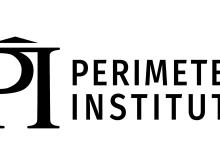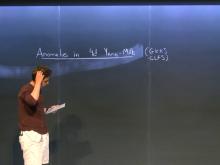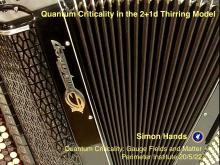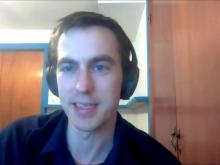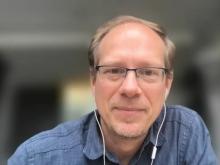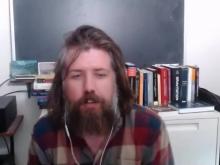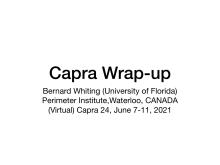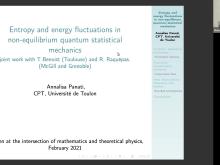Format results
-
29 talks-Collection NumberC22029
Talk
-

Welcome & Opening Remarks
-
Celine Zwikel Perimeter Institute for Theoretical Physics
-
Luca Ciambelli Perimeter Institute for Theoretical Physics
-
-

Review Talk: A primer on the covariant phase space formalism
Adrien Fiorucci Technische Universität Wien
-

Review Talk: A primer on the covariant phase space formalism cont.
Adrien Fiorucci Technische Universität Wien
PIRSA:22100003 -

Review Talk: An introduction to coadjoint orbits
Andrea Campoleoni University of Mons
-

Review Talk: An introduction to coadjoint orbits cont.
Andrea Campoleoni University of Mons
-

Gong Show
-
Arnaud Delfante University of Mons
-
Giovanni Canepa Aix-Marseille University
-
Gloria Odak Charles University
-
monireh ahmadpour University of Tehran
-
Florian Ecker Technische Universität Wien
-
-

Local Holography and corner symmetry: A paradigm for quantum gravity
Laurent Freidel Perimeter Institute for Theoretical Physics
-

Residual gauge symmetries in the front form
Sucheta Majumdar École Normale Supérieure de Lyon (ENS Lyon)
-
-
School on Table-Top Experiments for Fundamental Physics
27 talks-Collection NumberC22030Talk
-

Welcome & Opening Remarks
-
Asimina Arvanitaki Perimeter Institute for Theoretical Physics
-
Junwu Huang Perimeter Institute for Theoretical Physics
-
Davide Racco ETH Zurich
PIRSA:22090001 -
-

Standard Model & EDM, g-2
Jesse Thaler Massachusetts Institute of Technology (MIT)
-

-

5th forces and astrophysical probes
Peter Graham Stanford University
-

Atom interferometry, atomic clocks
Jason Hogan Stanford Law School - The Bill Lane Centre for the American West
-

Non thermal DM/Misalignment
Giovanni Villadoro The Abdus Salam International Centre for Theoretical Physics (ICTP)
-

Non thermal DM/Misalignment
Giovanni Villadoro The Abdus Salam International Centre for Theoretical Physics (ICTP)
-

Atom interferometry, atomic clocks
Jason Hogan Stanford Law School - The Bill Lane Centre for the American West
-
-
Cold Atom Molecule Interactions (CATMIN)
22 talks-Collection NumberC22028Talk
-

Introduction & Welcoming Remarks
James Shaffer Quantum Valley Ideas Laboratories
-

Perimeter Greeting
Paul Smith Perimeter Institute for Theoretical Physics
-

-

Indirect spin-spin interactions with Rydberg molecules
Hossein Sadeghpour Harvard University
-

-

-

Polyatomic ultralong range Rydberg molecules
Rosario Gonzalez-Ferez University of Granada
-

Observation of linewidth narrowing in EIT polarization spectroscopy involving hot Rydberg atoms with Laguerre Gaussian modes
Luis Marcassa Universidade Estadual Paulista (UNESP)
-
-
Young Researchers Conference
17 talks-Collection NumberC22027Talk
-

Looking for Quantum-Classical Gaps in Causal Structures
Marina Maciel Ansanelli Perimeter Institute for Theoretical Physics
-

Geometry of Process Matrices
Fionnuala Ni Chuireain Institute of Photonic Sciences (ICFO)
-

Improving 3D Codes under Biased Noise
Eric Huang University of Maryland, College Park
-

General Features of the Thermalization of Particle Detectors and the Unruh Effect.
Tales Rick Perche Nordic Institute for Theoretical Physics
-

-

Illuminating the pair-instability supernova mass gap with super-kilonovae
Aman Agarwal University of Greifswald
-

Reflecting scalar fields in numerical relativity
Conner Dailey Friedrich Schiller University Jena
-

-
-
QFT for Mathematicians 2022
28 talks-Collection NumberC22011Talk
-

Welcome and Opening Remarks
Kevin Costello Perimeter Institute for Theoretical Physics
-

3d Theories and Twists I
Kevin Costello Perimeter Institute for Theoretical Physics
-

3d Gauge Theory and Elliptic Stable Envelopes I
Andrei Okounkov Columbia University
-

Classical BV Formalism and Topological Quantum Field Theory
Philsang Yoo Seoul National University
-

-

3d B Models and Knot Homology I
Lev Rozansky University of North Carolina at Chapel Hill
-

On Boundary VOA's
Davide Gaiotto Perimeter Institute for Theoretical Physics
-

3d Gauge Theory and Elliptic Stable Envelopes II
Mykola Dedushenko Stony Brook University
-
-
Global Categorical Symmetries
34 talks-Collection NumberC22008Talk
-

Welcome and Opening Remarks
Theo Johnson-Freyd Dalhousie University
-

Non-Invertible Symmetries in d>2
Justin Kaidi Stony Brook University
-

Monodromy and derived equivalences
Andrei Okounkov Columbia University
-

Lessons from SU(N) Seiberg-Witten Geometry
Emily Nardoni University of Tokyo
-

Vertex algebras and self-dual Yang-Mills theory
Kevin Costello Perimeter Institute for Theoretical Physics
-

Non-invertible Global Symmetries in the Standard Model
Shu-Heng Shao Stony Brook University
-

Analytic Langlands correspondence over C and R
Pavel Etingof Massachusetts Institute of Technology (MIT)
-

A (kind of) monoidal localization theorem for the small quantum group
Cris Negron University of Southern California
-
-
Quantum Criticality: Gauge Fields and Matter
27 talks-Collection NumberC22009Talk
-

Welcome and Opening Remarks
-
Roger Melko University of Waterloo
-
Shailesh Chandrasekharan Duke University
-
Ribhu Kaul University of Kentucky
-
-

Blackboard Talk 1 - Virtual
Senthil Todadri Massachusetts Institute of Technology (MIT) - Department of Physics
-

Blackboard Talk 2
Senthil Todadri Massachusetts Institute of Technology (MIT) - Department of Physics
-

-

Reducing the Sign Problem with Complex Neural Networks
Johann Ostmeyer University of Liverpool
-

Self dual U(1) lattice field theory with a theta-term
Christoff Gatringer FWF Austrian Science Fund
-

Quantum electrodynamics with massless fermions in three dimensions - Talk 1
Rajamani Narayanan Florida International University
-

Quantum electrodynamics with massless fermions in three dimensions - Talk 2
Rajamani Narayanan Florida International University
-
-
Gravitational Waves Beyond the Boxes II
15 talks-Collection NumberC22013Talk
-

Welcome and Opening Remarks
-
William East Perimeter Institute for Theoretical Physics
-
Reed Essick Canadian Institute for Theoretical Astrophysics (CITA)
-
Luis Lehner Perimeter Institute for Theoretical Physics
-
Daniel Siegel University of Greifswald
-
Suvodip Mukherjee Tata Institute of Fundamental Research (TIFR)
-
Huan Yang Tsinghua University
-
-

Measure the cosmic expansion history of the Universe using GW sources
Jonathan Gair Max Planck Institute for Gravitational Physics (Albert Einstein Institute)
-

Cross-correlation technique in GW cosmology
Benjamin Wandelt Institut d'Astrophysique de Paris
-

Matter in Extreme Conditions
Katerina Chatziioannou California Institute of Technology (Caltech)
-

Matter Effects in Waveform Models
Geraint Pratten University of Birmingham
-

Dark matter, PBHs, boson clouds
Salvatore Vitale Massachusetts Institute of Technology (MIT)
-

Multi-band GW observation from the third-generation detectors
Hsin-Yu Chen Massachusetts Institute of Technology (MIT)
-

-
-
Postdoc Welcome 2021
18 talks-Collection NumberC21007Talk
-

Welcome and Opening Remarks
-
Matthew Johnson York University
-
Cheng-Ju Lin University of Maryland, College Park
-
-

Tsung-Cheng (Peter) Lu
Tsung-Cheng Lu (Peter) University of Maryland, College Park
-

-

-

-

-

Suvodip Mukherjee
Suvodip Mukherjee Tata Institute of Fundamental Research (TIFR)
-

-
-
Quantizing Time
36 talks-Collection NumberC21004Talk
-

Welcome and Opening Remarks
-
Alexander Smith Saint Anselm College
-
Flaminia Giacomini ETH Zurich
-
-

-

Kappa-Minkowski: physics with noncommutative time
Flavio Mercati University of Naples Federico II
-

Quantizing causation
Robert Spekkens Perimeter Institute for Theoretical Physics
-

Non-causal Page-Wootters circuits
Veronika Baumann Institute for Quantum Optics and Quantum Information (IQOQI) - Vienna
-

Quantum reference frames for space and space-time
Časlav Brukner Institute for Quantum Optics and Quantum Information (IQOQI) - Vienna
-

-

A New Perspective on Time Reversal Motivated by Quantum Gravity
Abhay Ashtekar Pennsylvania State University
-
-
The 24th Capra meeting on Radiation Reaction in General Relativity
77 talks-Collection NumberC21006Talk
-

-

Self force review
Maarten van de Meent Max Planck Institute for Gravitational Physics - Albert Einstein Institute (AEI)
-

Discontinuous collocation methods and self-force applications
Charalampos Markakis Queen Mary University of London
-

Conformal numerical method for self force applications in the time domain
Lidia Joana Gomes Da Silva Queen Mary University of London
-

Kerr self-force via elliptic PDEs: Background and theory (part 1)
Nami Nishimura State University of New York (SUNY)
-

Kerr self-force via elliptic PDEs: Numerical methods (part 2)
Thomas Osburn State University of New York (SUNY)
-

A multi-mode time-domain surrogate model for gravitational wave signals from comparable to extreme mass-ratio black hole binaries
Tousif Islam University of Massachusetts Dartmouth
-

Fast Self-Forced Inspirals into a Rotating Black Hole
Philip Lynch University College Dublin
-
-
Women at the Intersection of Mathematics and Theoretical Physics
16 talks-Collection NumberC21002Talk
-

Welcome and Opening Remarks
-
Bianca Dittrich Perimeter Institute for Theoretical Physics
-
Theo Johnson-Freyd Dalhousie University
-
Sylvie Paycha University of Potsdam
-
Katarzyna Rejzner University of York
-
Anne Taormina Durham University
-
Reiko Toriumi Okinawa Institute of Science and Technology Graduate University
-
-

Division algebraic symmetry breaking
Cohl Furey Humboldt University of Berlin
-

State sum models with defects
Catherine Meusburger University of Erlangen-Nuremberg
-

Quantum information and black holes
Johanna Erdmenger University of Würzburg
-

Researcher Presentations
-
Karen Yeats University of Waterloo
-
Sabine Harribey Dublin Institute For Advanced Studies
-
Philine van Vliet Deutsches Elektronen-Synchrotron DESY
-
Maria Elena Tejeda-Yeomans University of Colima
-
Maryam Khaqan Emory University
-
-

Mathematical Puzzles from Causal Set Quantum Gravity
Sumati Surya Raman Research Institute
-

On generalized hyperpolygons
Laura Schaposnik University of Illinois at Chicago
-

Exploring spacetime beyond classicality
Renate Loll Radboud Universiteit Nijmegen
-
-
Quantum Gravity Around the Corner
29 talks-Collection NumberC22029There has been recent activity in looking for new conserved charges and symmetries in gravity, most notably at infinity but also for finite regions. An important question is whether some of these charges and symmetries have physical implications. These charges are evaluated on codimension-2 surfaces called corners, which constitute the main focus of this conference. The goal is to bring together leading experts and promote discussions and exchanges among different approaches to (quantum) gravity.
Territorial Land Acknowledgement
Perimeter Institute acknowledges that it is situated on the traditional territory of the Anishinaabe, Haudenosaunee, and Neutral peoples.
Perimeter Institute is located on the Haldimand Tract. After the American Revolution, the tract was granted by the British to the Six Nations of the Grand River and the Mississaugas of the Credit First Nation as compensation for their role in the war and for the loss of their traditional lands in upstate New York. Of the 950,000 acres granted to the Haudenosaunee, less than 5 percent remains Six Nations land. Only 6,100 acres remain Mississaugas of the Credit land.
We thank the Anishinaabe, Haudenosaunee, and Neutral peoples for hosting us on their land.
-
School on Table-Top Experiments for Fundamental Physics
27 talks-Collection NumberC22030This School aims at bringing together graduate students and junior postdocs, both theorists and experimentalists, who are interested in proposing and realizing new table-top experiments to test fundamental physics. The goal is to allow them to interact and learn from each other, forming a community.
The School will consist of some theoretical lectures for experimentalists, and experimental lectures for theorists. The scope is to offer basic and relevant notions of each field to physicists with a different background, in order to fill some of the gaps of the respective academic curricula.
The theoretical lectures will cover a review of the Standard Model with emphasis on precision tests, such as the search of new long-range forces and of electrical dipole moments. Another main topic will be a focused introduction on Dark Matter, looking at its cosmological production mechanisms, its impact on astrophysics and cosmology, and its laboratory detection.
On the experimental side, the School will cover a range of techniques for probing weak electromagnetic fields, short distance forces, single photons, fundamental electric dipole moments, as well as atom interferometers and optomechanical sensors.Territorial Land Acknowledgement
Perimeter Institute acknowledges that it is situated on the traditional territory of the Anishinaabe, Haudenosaunee, and Neutral peoples.
Perimeter Institute is located on the Haldimand Tract. After the American Revolution, the tract was granted by the British to the Six Nations of the Grand River and the Mississaugas of the Credit First Nation as compensation for their role in the war and for the loss of their traditional lands in upstate New York. Of the 950,000 acres granted to the Haudenosaunee, less than 5 percent remains Six Nations land. Only 6,100 acres remain Mississaugas of the Credit land.
We thank the Anishinaabe, Haudenosaunee, and Neutral peoples for hosting us on their land.
-
Cold Atom Molecule Interactions (CATMIN)
22 talks-Collection NumberC22028In the first edition of the meeting, CATMIN (Cold ATom Molecule INteractions) was a new satellite meeting of ICPEAC devoted to the study of atomic and molecular systems, where long-range interactions and the extreme properties of highly excited electrons produce new physics and lead to new technologies. CATMIN's objective is to strengthen the links between cold atom physics, molecular physics, chemistry and condensed matter physics, so that new concepts and breakthroughs can emerge. Ions, atoms and molecules are naturally made quantum systems that can be controlled with light and low frequency electromagnetic fields, thus lending themselves to precision investigations and use in quantum technologies. The second CATMIN conference will be held a few days before the ICAP, which is a major conference in AMO physics, with the idea that scientists can attend both meetings. The CATMIN meeting will be a two-day conference held at the Perimeter Institute in Waterloo, ON, centered on Rydberg-atom physics, cold ion physics and the interplay between these experimental platforms. Rydberg atom physics is experiencing a renaissance due to the application of the exaggerated properties of highly excited atoms for quantum information and quantum simulation. Rydberg states can even be observed in solids which is a subject of increasing interest. Cold ions, similarly, are exciting for quantum simulation and computing, becoming one of the central platforms in the race to build a quantum computer. Many exciting developments are also in progress in the area of cold-molecules. Long-range interactions open up fields of research such as the photo-association of cold atoms to form ultra-cold molecules, and the excitation of Rydberg molecules demonstrating novel kinds of molecular bonding. Strong long-range interactions in all the systems permit the investigation of the few-body and many-body regimes, including the few- to many-body transition. The conference aims to share the latest developments and results in these exciting fields among the various ICAP communities as well as the broader physics and chemistry communities. Overall, the conference can forward quantum science and the application of quantum science, which furthers these fields of research by concentrating interest to attract people and resources to the field.
Sponsorship for this event has been provided by:

Perimeter Institute will make every effort to host the conference as an in-person event. However, we reserve the right to change to an online program to align with changes in regulations due to the COVID-19 pandemic.
Territorial Land Acknowledgement
Perimeter Institute acknowledges that it is situated on the traditional territory of the Anishinaabe, Haudenosaunee, and Neutral peoples.
Perimeter Institute is located on the Haldimand Tract. After the American Revolution, the tract was granted by the British to the Six Nations of the Grand River and the Mississaugas of the Credit First Nation as compensation for their role in the war and for the loss of their traditional lands in upstate New York. Of the 950,000 acres granted to the Haudenosaunee, less than 5 percent remains Six Nations land. Only 6,100 acres remain Mississaugas of the Credit land.
We thank the Anishinaabe, Haudenosaunee, and Neutral peoples for hosting us on their land.
-
-
-
-
Quantum Criticality: Gauge Fields and Matter
27 talks-Collection NumberC22009Quantum Criticality: Gauge Fields and Matter -
Gravitational Waves Beyond the Boxes II
15 talks-Collection NumberC22013Gravitational Waves Beyond the Boxes II -
Postdoc Welcome 2021
18 talks-Collection NumberC21007As COVID-19 continues to impose gathering restrictions, the “Postdoc Welcome 2021” will continue as a virtual event this year and will be hosted on Thursday, October 28 and Friday, October 29. Each new postdoc will be given 5 minutes to introduce themselves to the PI Community. The time will be used to tell us a little bit about themselves and to showcase their current research. These presentations are very casual and should not be misconstrued as formal talks. Some discussion will follow the presentations, whereby current PI Residents may have the opportunity to ask questions.
There will be two 60-minute sessions:
Thursday, October 28: 12:00 – 1:00 pm
Friday, October 29: 11:30 – 12:30 pmAll PI Residents are encouraged to attend. Registration will remain open until 9:00 am on Thursday, October 28.
Please register for the Postdoc Welcome via the event website: https://events.perimeterinstitute.ca/event/9/overview
-
Quantizing Time
36 talks-Collection NumberC21004 -
The 24th Capra meeting on Radiation Reaction in General Relativity
77 talks-Collection NumberC21006 -
Women at the Intersection of Mathematics and Theoretical Physics
16 talks-Collection NumberC21002
